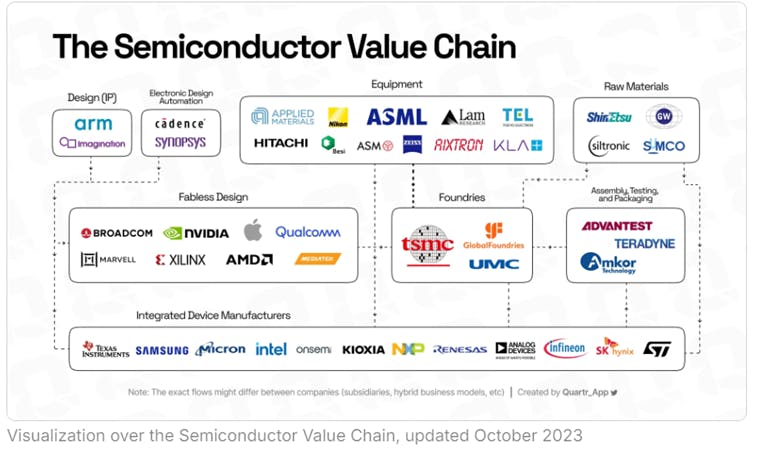Dimensional U.S. Core Equity 2 ETF (DFAC-A) Quote – Press Release – The Globe and Mail
The semiconductor industry has undergone remarkable growth and transformation since its inception, playing a pivotal role in shaping the modern technological landscape. While Nvidia has seemingly become the most familiar name for many familiarizing themselves with the semiconductor industry, other stakeholders are of seminal importance.
The semiconductor value chain is a complex network of companies and processes involved in designing, manufacturing, testing, packaging, and distributing semiconductor components. It encompasses a series of stages and stakeholders, each playing a crucial role in bringing semiconductor products from concept to end-users. The value chain involves collaboration between semiconductor manufacturers, foundries, equipment suppliers, design houses, and other entities.
This article will provide a look at the current semiconductor industry and the wealth-generating opportunities that are present across the value chain. A summarized look at the various participants within the semiconductor supply chain is detailed below:
Semiconductor chip designs are created for either specific or general product usage. Integrated Device Manufacturers (IDMs), such as Intel, AMD, and Samsung, take charge of all processes in producing semiconductors from planning to producing the final products. Conversely, fables design companies, like Qualcomm and Nvidia, focus on designing semiconductor components but outsource the manufacturing process to third-party foundries.
Within the semiconductor industry, a few key equipment makers have become crucial, enabling the creation of ever-smaller, more efficient chips. Companies like ASML, Applied Materials, and Lam Research provide the tools and machinery required for semiconductor manufacturing processes. Various companies supply materials such as silicon wafers, chemicals, and gases essential for semiconductor production.
Silicon wafers are processed through a complex and extensive series of manufacturing steps. Companies such as Taiwan Semiconductor Manufacturing Company (TSMC), GlobalFoundries, and Samsung Foundry specialize in manufacturing semiconductor wafers based on designs provided by fabless design companies or IDMs.
Semiconductor chips are assembled into packages to form electronic components that can be mounted onto circuit boards. Outsourced Semiconductor Assembly and Testing (OSAT) Companies, such as Amkor Technology and ASE Group, specialize in packaging and testing semiconductor devices, ensuring chips can perform under different electrical and temperature conditions.
Semiconductors have become an essential component of the global economy, as evidenced by their integration into vehicles, smartphones and devices, and the technological infrastructure of our modern society. Given their integral nature, investors would benefit from having exposure to the industry within their portfolio. In looking at the annual returns of the U.S. iShares Semiconductor ETF (Ticker: SOXX) for the past decade, investors have benefitted immensely from comprehensive semiconductor industry exposure.
For Canadian investors, the Canadian iShares Semiconductor Index ETF (Ticker: XCHP) provides exposure to U.S.-listed equity securities that are in the semiconductors industry. It should be noted that XCHP was recently listed, having an inception date of September 6th, 2023, thus having less than one year of performance. Alternatively, the Global X Semiconductor Index ETF (Ticker: CHPS/CHPS.U) seeks to provide exposure to the performance of global, publicly listed companies engaged in producing and developing semiconductors and semiconductor equipment. Launched on June 21, 2021, this fund has an established track record and provides comprehensive exposure to the global semiconductor industry.
Recently, against the backdrop of semiconductor fervor, more AI-focused ETF solutions have come to market, providing exposure to companies that will benefit from the further development and utilization of artificial intelligence (AI) technology in their products and services.
Global X Canada launched the Global X Artificial Intelligence & Technology Index ETF (Ticker: AIGO), which seeks to replicate the Indxx Artificial Intelligence & Big Data Index, which reflects companies that benefit from the development and utilization of Artificial Intelligence (“AI”) technology in their products and services, as well as companies that produce hardware used in Artificial Intelligence applied for the analysis of Big Data. Invesco Canada also launched an AI-focused solution, the Invesco Morningstar Global Next Gen AI Index ETF (Ticker: INAI/INAI.F), which replicates Morningstar® Global Next Generation Artificial Intelligence Index™; which is designed to deliver unparalleled, thematically pure exposure to leading-edge artificial intelligence technologies, including generative artificial intelligence and adjacent products and services.
With demand for semiconductors growing globally, investors who maintain some exposure to this industry are poised to benefit materially in the present and years to come.
Please note this article is for information purposes only and does not in any way constitute investment advice. It is essential that you seek advice from a registered financial professional prior to making any investment decision.
All market data (will open in new tab) is provided by Barchart Solutions. Copyright © 2024.
Information is provided 'as is' and solely for informational purposes, not for trading purposes or advice. For exchange delays and terms of use, please read disclaimer (will open in new tab).
Fundamentals information provided by Fundata Canada Inc.
© Copyright 2024 The Globe and Mail Inc. All rights reserved.
Andrew Saunders, President and CEO